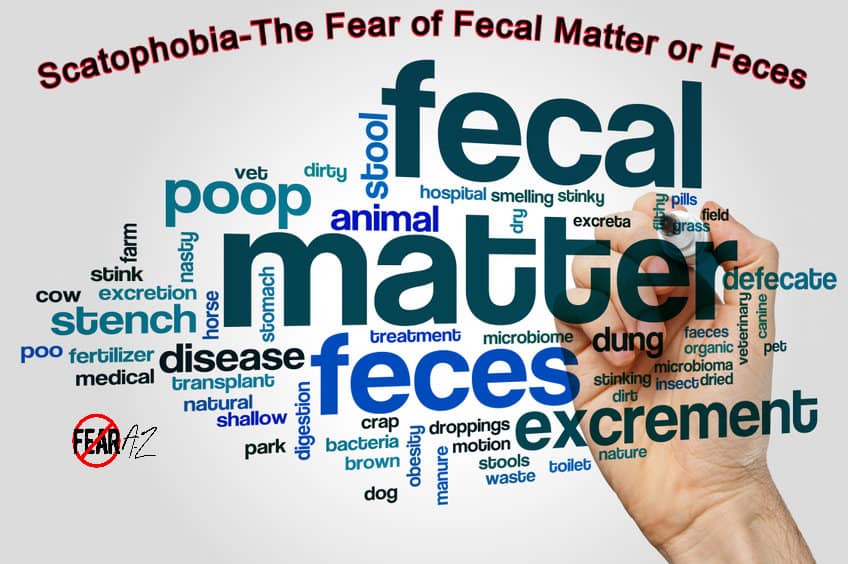Share This Article
Scatophobia Is Known as the Extreme Fear of Fecal Matter
When the “fecal matter hits the fan!” Have you ever woken up in the middle of the night with the urge to go number 2, but are too scared to go to the bathroom?
Does even the thought of feces scare you? If your answer to this question is a resounding yes, then you are most likely suffering from a fear of poop phobia. Scatophobia, or coprophobia, is known as the fear of fecal matter or feces.
Scatophobia is a ‘disgust’ phobia and manifests through feelings of deep shame, disgust, and anxiety in the minds of those who suffer from it.
Scatophobia: A phobia of fear or disgust?
Scatophobia is considered to be a specific phobia that comes under the classification of anxiety disorders in the DSM-V. If you are someone who suffers from scatophobia, it’s not uncommon to experience excessive sweating, fear, and unexplained body aches.
Since scatophobia is considered an irrational fear, those suffering from it tend to withdraw and avoid social contact fearing ridicule. However, like other phobias, scatophobia is curable. There are several ways to overcome it, but you must acknowledge it first.

Everything You Need to Know about Scatophobia
Scatophobia is known as the fear of poop or fecal matter. The word scatophobia derives from the Greek words scato which means “feces” and phobia, which means “fear.” Scatophobia is also known by other names such as coprophobia or koprophobia. Someone suffering from scatophobia may constantly suffer the stress of anxiety from merely thinking about feces. As if that’s not enough, some may even suffer panic attacks due to the intense fear of poop.
Simply put, scatophobia leads to extreme discomfort for some just by thinking about feces. Is scatophobia a form of OCD? Those suffering from obsessive-compulsive disorder (OCD) may perceive the world as being free of waste and contamination. Since poop is a form of waste, those with scatophobia may be obsessed with keeping themselves and their surroundings clean and removing feces from their bodies completely. Because of this, scatophobia can be considered as the fear of feces OCD.
Characteristics of Scatophobia
Let’s take a look at some of the key characteristics of scatophobia:
- Uncontrollable and excruciating fear of fecal matter
- Based on irrational thoughts, leading to distorted and extreme thoughts about the harm that can be caused when in contact with feces
- Persistent fear that doesn’t appear at specific moments; scatophobia symptoms can appear anytime and don’t disappear until certain interventions are performed
- Those with scatophobia will avoid contact with fecal matter at all costs; they will not even want to look at their own poop and may want to run away as soon as they can
Scatophobia Causes
It has not been possible yet to identify any single cause of scatophobia. Scatophobia, like many other phobias, can develop as a result of genetic and/or environmental factors. If you have a family disposition towards anxiety disorders or certain phobias, you are at a higher risk of developing phobias such as scatophobia. Additonally, you’re at higher risk of developing scatophobia if there were unpleasant experiences related to feces that may have taken place in your past.
For instance, you may have used a washroom or a public restroom that was unclean and had feces all over it. Or, you might have accidentally stepped on poop, saw someone poop, or had poop thrown at you which, in turn, led to ridicule and mockery by others. These incidents then triggered unpleasant feelings related to fecal matter leading to scatophobia.
Scatophobia Symptoms
Let’s take a look at the specific mental, emotional, and physical symptoms of scatophobia.
Mental/Emotional Symptoms
- Helplessness
- Feeling dejected and hopeless
- Mood swings
- Overthinking and obsessing over poop
- Compulsive behavior
- Guilt and self-loathing
- Anxiety and fear
- Anger and aggressive behavior
- Irritability
Physical Symptoms
- Shortness of breath
- Choking sensation
- Hot and cold flashes
- Excessive sweating
- Trembling
- Nausea
- Vomiting
- Pain in the chest
- Dry mouth
- Increased blood pressure
- Confusion and dizziness

How Can I Get Over My Fear of Poop?
Someone suffering from scatophobia might feel there is no cure for their fear and that they may have to live with it forever. However, this is far from true. Scatophobia treatment is available in various forms, including self-help and professional help. Let’s look at each of these in detail.
What Can I Do to Help Myself with Scatophobia?
If you don’t want to seek professional help or believe that you can overcome scatophobia on your own, then there are various self-help techniques to choose from.
Meditation
There are various forms of meditation that can help you overcome scatophobia. Specifically, mindfulness meditation is known to be effective when it comes to treating phobias. Under mindfulness, individuals learn how to distract themselves from intrusive and disturbing thoughts related to scatophobia and divert them towards positivity. Moreover, mindfulness meditation helps you connect with yourself, your breathing, the movements of the muscles in your abdomen and chest, and the sounds around you.
Reducing Caffeine Consumption
Caffeine is a chemical compound commonly found in tea, coffee, and dark chocolate. It’s a well-known fact that consuming high amounts of caffeine can increase anxiety and the probability of panic attacks. While completely removing caffeine from your diet may not be necessary, reducing its intake will definitely prove to be beneficial. Doing so won’t cure anxiety attacks, but it will help reduce unnecessary issues related to consuming high amounts of caffeine. You might also observe a reduction in the intensity of other symptoms related to scatophobia once you reduce or eliminate caffeine.
Professional Help for Scatophobia
If self-help techniques aren’t effective, seeking professional help might be the best option. Therapists apply various techniques to help you overcome your phobia. These may include mindfulness-based stress reduction (MBSR) and cognitive behavioral therapy (CBT). Let’s take a look at each of them.
Mindfulness-Based Stress Reduction (MBSR)
Mindfullness-based stress reduction therapy is an eight-week evidence-based program that offers intensive mindfulness training to help people overcome various phobias, anxiety, depression, stress, and other mental disorders. Under MBSR, those suffering from scatophobia will be taught skills that can help them cope with their fears and reduce the intensity of their symptoms.
Cognitive Behavioral Therapy (CBT)
Cognitive behavioral therapy is a form of psycho-social intervention often used in the treatment of anxiety disorders and OCD. In CBT, you learn how to identify and change your negative thought patterns, and come up with ways to replace them with positive thoughts. At times, therapists might also prescribe antidepressants or anti-anxiety medications to patients who are unresponsive to therapy. However, they should only be taken upon a doctor’s prescription and not consumed on one’s own will.
How to Avoid Scatophobia Altogether
If you want to avoid dealing with scatophobia altogether, try and avoid places where there are high chances of coming in contact with fecal matter. Such places include public restrooms and animal shelters. However, unlike many phobias, it’s difficult to avoid dealing with scatophobia. All creatures—including human beings—poop daily. We can’t avoid looking at or coming in contact with feces. This can be a difficult situation, especially if there are young children or pets in your living space. In these cases, it’s best to seek professional help or find self-help techniques to help overcome your fear of poop.
Summary
Scatophobia is completely treatable. If you have scatophobia, don’t worry. Find the right treatment and guidance. Very soon you’ll defeat your fears, helping you lead a normal and healthy life.
SOURCES:
https://optimistminds.com/scatophobia/
https://www.lifepersona.com/coprophobia-symptoms-causes-and-treatment



